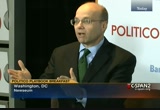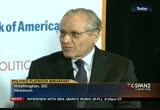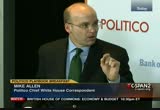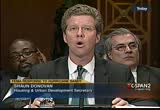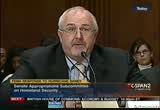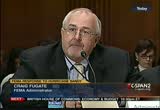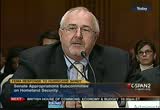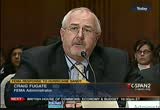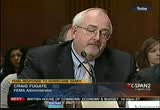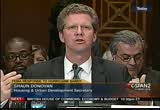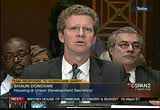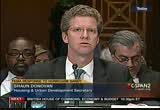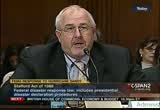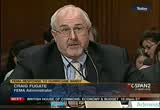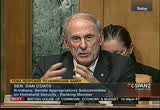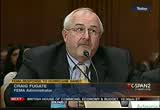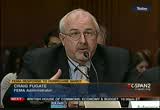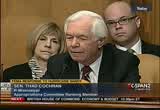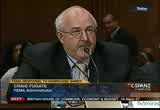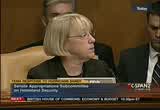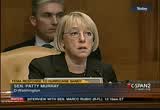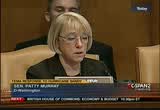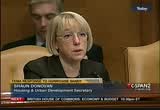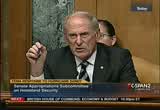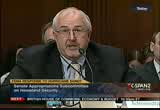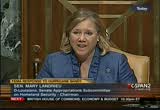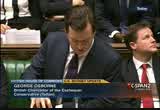tv Tonight From Washington CSPAN December 5, 2012 8:00pm-11:00pm EST
8:00 pm
[applause] >> good morning, thank you. welcome to play book breakfast. thank you for coming out so earl, excited for an amazing double header today, talking with senator rubio, last night, gave one of the first formal speeches looking ahead to the future of the republican party. we're going to talk to the senator about that. first, we have the amazing treat of bob woodward who has a fantastic book out on the last grand bargain negotiations is
8:01 pm
going to be joining us in just a second. first, welcome, all the people out in live stream land. we'll be taking your questions on hash tag "politico" breakfast. tweet us, welcome to the others watching. appreciative to the bank of america for making these conversations possible. we had a great partnership this year, including conventions, election night, and so we're very, very excited to be ail to bring these substantive conversations about the most important issues driving washington to you, thanks to the bank of america. thank you, john, and thank you to your colleagues. you may have gotten cards. we'll be bringing you into the conversation, think about what you're going to ask. without further adieu, we'll bring in bob woodward. mr. woodward? [applause]
8:02 pm
>> thank you. saving seats with my notes. i'll pick those up. >> which is your chair? >> you get the daddy chair. >> okay, thank you, thank you. >> so the price of politics, which has become a best seller, as all your books do, looked at the last cliff negotiations over the previous grand bargain that didn't quite get over the finish line. what does that teach us about the current cliff negotiations? >> well, it's ground hog day. the question who is playing bill murray? i mean such a repetition. it's the same players at the same seats at the table with the same doctrines, and, so, you know, where this goes, i -- i think anyone who thinks they know is wrong. as you know, they talk about the fiscal cliff. some people say it's a slope. somebody said it was a bungi
8:03 pm
jump. somebody said it was a skate board trip, down and then up and so forth. bottom line, i think, it's no way to govern. it is a giant mistake to have all of this in a pool of ambiguity, and as i understand it now, you would know more. i mean, it truly is a stalemate. they are not talking. >> now, you point out that it's the same player, and, i think, you'll agree player that is matter most are the president, speaker boehner. what do we know about the personal relationship that might illuminate what's going on right now? >> well, they started out last year when they were working on the debt ceiling, and they had what are calledded the merlot and nicorette's meetings. in other words, boehner would have a merlot, and obama would chew nicorette.
8:04 pm
>> you point outside in the book somehow when they took the official photo, both of those vanished. >> yes. they had iced tea there for obama. of course, boehner had his seg represent, and they put the cigarette in the ashtray away for the picture, but they have not closed the deal on the personal relations, and that's a shame. i think if somebody, instead of sponsoring your breakfast and all, sponsor a weekly dinner between obama and boehner and everyone would agree to pay for it and let them just talk and get to know each other and see, you know, it's -- >> how much -- >> oh, that's right. what do you think? >> i think that's a great idea. [inaudible] a special room. >> i'm not sure --
8:05 pm
[inaudible] >> yeah, okay, but, well, you know, but, i, you know, personal relationships, when john was the fbi spokensman, he was not helpful, but you could talk to him, get him on the phone, and if you had a good story, he'd confirm it by laughing, a deep laugh meant you were on the right track. no laughter meant no. [laughter] >> now, it looks like the tide is very much going against republicans. do you agree with that? >> well, no. i think in the short political term, yes. polling shows republicans will be blamed. remember, this is the obama era. it's going to go down as his economy. i ask people who was speaker of the house during the great
8:06 pm
depression when roosevelt was president. i'll give a hundred dollars to anyone who can name who the speaker of the house was in the critical first hundred days -- >> jim over there would know. >> henry thomas reigny. now, there's a name in the history books. point being, the speaker is an important player, this is significant, but it is obama's job to lead and define so if there's negative consequences here, particularly in the economy, it's going to be in the obama era, things didn't get fixed. who is it? the australian finance minister who says the united states is one budget deal away from being a great country. there's a lot of people in
8:07 pm
business who think we are poised to do some really good things in the global economy, the united states is, but if we can't untangle this mess, it's not going to happen. >> you know about the inner workings in the government more than any living person, every single administration of our lifetime. you've been behind the scenes -- >> what nonsense you're talking. yes, all right. [laughter] >> are you now optimistic or pessimistic about the way that australian finance minister posed the question? >> you know, in the end, i think things will be fixed. the question is when and what price do you pay on ray road to getting them fixed? you know, i don't think you govern by playing chicken. i say that to democrats, republicans, the white house,
8:08 pm
the congress. you know, they should sit down and really talk this out and the old joe biden way when he dealt with mitch mcconnell a couple years ago. extend the bush tax cuts, in the white house, they called biden the mcconnell whisperer, and the horse whisperer, and the way, one for you, one for me, and that's the way you make a deal. >> this moment, look to you we have a deal by christmas eve, new year's eve or over the cliff? >> who knows. somebody who thinks they know is only guessing. maybe there's a strategy in the white house, you know, by a certain date they'll work it out. >> play book, we always start the morning with the papers.
8:09 pm
we still love the print papers, assistant of the washington post, which, this morning, says fiscal warning yet to phase wall street. the stock markets are convinced that the fiscal drama is going to work out. the financial times has the opposite headline. they say wall street anxiety grows so which of these is more true? >> you know, -- [laughter] on wall street, they live in a zone of peaceful coexistence of optimism and pessimism. you can talk to somebody in the investment world in wall street, and in the morning, they are optimistic, and in the afternoon, they are pessimistic. i think one, you know, don't know, but both papers have great reporters in their talking to people about that, and so forth,
8:10 pm
and if you look -- i would go with the post in the short run because look what the markets have done. they have not sunk. >> now, when you talk to people behind the scenes, after camera, tape recorder off, what do they tell you about what's likely to happen? >> i think there's a lot of real worry. i -- >> worry about what? >> worrieded that we are not going to fix the, you know -- look, what's the bottom line here? the fiscal house of the united states government, the financial house, is not in order. it's in disarray. in a way that no one would permit in their business. bank of america; right, john? they would never permit this kind of incoherence in what the policy is, what they are going to take in and what they will spend. >> question about this topic, based on your reporting, what
8:11 pm
you learned, how far is the president willing to go on entitlement cuts? >> when i talked to the president in the summer on this, he acknowledged it was bad policy for he and democrats to cut medical beneficiaries. he then went on, and, you know, i think in the end, you can't be president and not be a realist, and he said that it is untanble to not cut them because they are driving the budget deficit, and, you know, the whole entitlement issues, the real core of the problem, the taxing issue, yes, the pyrotechnics, and its -- there's the struggle between the republican and democratic view, but all the numbers people know
8:12 pm
that it's the entitlement issue so if there's a fix, trajectory to make it somehow stable, that would be -- that's the relation. uh-oh, you have something from the book. >> your books are all ultimately about power, how it's used, squandered, built, and so the sub text of the events that you write about is how life works, how washington works. my favorite sentence in "the price of politics" is, "when you need friends, it's too late to make them." what have you learned about washington and life from the grand bargain? what is the hundred-year lesson from how that unraveled? >> well, you mean last year? what happened last year? well, that they found a way to postpone everything, and, again, they can postpone lots of the problems, but postponement is
8:13 pm
the theme. the cliche, "kicking the can down the road," i don't know what the can is, but it is postponing the hard decisions, and too bad. they should make them. they should make the hard decisions. i think if, you know, the hypothetical weekly dinner between the president and boehner, if that occurred or a weekly golf game. it's now weather, we can did -- we can go back to golf. that would be such a good and fruitful thing because, look, what, trying to write particularly about presidents, you are driving at the question "who is barack obama"? you live in the world. do you think we foulingly -- fully understand who barack obama? >> if anyone would, it's you. >> no, i'm asking you.
8:14 pm
[laughter] >> of course, there's always something to cover. >> is there elements or uncertainty -- >> of course, that's why he's fascinating to cover. >> maybe in him, one of the things, i mean, you covered george w. bush, i wrote four books on him. there was not a lot of mystery about what bush felt -- >> a gut player. >> yes, yes, a gut player, and as he said, you know, his call see yum in the spine. obama is an uncertain figure, and, quite frankly, when he writes his own autobiography about his time as president, and there's more excavation of all of this, we're going to discover he's working it out as he plays the game, and somebody was a
8:15 pm
little more experience under their belt might not be doing that. >> some of the comments made about president obama, incoming with what you said, used to be a sub text, that you're disappointed over overwhelmed? >> not disappointed, but goes to the question of what's our job in the news media? our job is not to be cheerleaders. our job is to be, i mean, "politico" specializes in a 24/7 irritant, and not in a negative way, but you are asking and raising questions, and it is the job, and obama had -- look, what's the -- what's happened in the last many decades in the presidency? increasing concentration of power.
8:16 pm
there's the catastrophe in japan. in the united states, they immediately want to say what's the president doing? what's he saying? what's the policy? what's the action. thirty years august, that would be a question, but it would not be a central question. presidents have the -- amazing what they can do. obama has more power than bush had, for instance. >> yet, i believe it's your view we know less about our presidents, less about the inner workings of the white house. why is that? is that our fault? >> well, it is, in part, our fault, and the managers in the white house get better and better and more skillful, and that it's a bearier -- barrier often, and god knows how much time i spent breaking down, breaking that log jam ?t white house saying i'm doing this book, i've got stories, i got memos. i got these notes to answer
8:17 pm
questions. it's not something where they are standing there on pennsylvania avenue saying to the reporters, come on, we're dying to have you hold us accountable for what we are doing. >> now, you do manage to break people down, but what has the white house said, shutting bob down, whoever works for us would be fired, what would you do? >> another book like john or something like that. you know, i don't know. i think that they, look, there is a sense in every white house whether they are misguided or not or on the right track, whether they are sincere. our job is to listen, i think the key is to take them as seriously they take themselveses. bush and obama have long memos
8:18 pm
saying this is what i want to talk about, they look at it, and say, my god, somebody worked a year on how i'm doing my job, of course, i'm going to respond. >> very unusual technique. what did you say to president obama on politics? >> a dozen page meme toe saying these are the key points and what i understand happened, and much was new. they'll look at that. i sent bush a 21-page memo, and colleagues at the post said, you finally lost your mind. >> i love that. >> because there's no evidence in bush's biography in years of yale and harvard business school that he ever read anything more
8:19 pm
than 21 pages, and that he read it right away. rice said you're doing this book and the articles in the post no matter whether you talk to the president or not. i said, sure, and she said, he'll see you tomorrow. >> now, is what you do getting easier or more difficult? >> that's a good question. no, it's difficult because the message managers are better. you know, they have staffs, and they work at it aggressively. i'm older. i have less energy. >> tell us something about the obama white house that we don't know. >> oh. what does obama think of mitt romney? you know, what does he really think, and i think he feels that
8:20 pm
romney is incompetent because he didn't run a better campaign. i suspect a theme in the coverage of the campaign is going to be that romney never found a way, the message or the theme of how to run against obama where he thought it would be easy. >> what is the one thing you want to know about president obama that you don't? >> i did ask this, i didn't put it in the book, but he keeps a diary. i'd like to have access. [laughter] >> assume that -- >> and he said, do you keep a diary? yes, oh, not on all the detail kind of, and i, you know, come on, let's see it.
8:21 pm
so i'm sure there will be an interesting memoir. >> what did he tell you about the diary? >> that it existed. no detail. he didn't offer any of it or read from it or anything like that. is it dictated? is it written? who, you know, reagan kept his diary secret. george w -- and now they published all of reagan's diary ies. i mean, who would have thought? certainly obama much more a sense of history and literature and writing from his own books and so forth which are very kind of address the question, "what's the inner live i am living?" it's interesting before he was
8:22 pm
president. it's really interesting now, and a description of the inner life will be something because it's candid. let's, you know, i'm going to put in a freedom of information act request for obama's diary. maybe it's done on government time, and maybe the diary, itself, is a gsa notebook or something like that, and so they can't -- exception, no, obviously, not going to get it, but i look for -- i worry what we don't know. i'm sure it's larger than what we do thankfully know -- >> about? >> about him, about what he's doing, what's driving him, who's barack obama? >> last question about to get the hook, got the melt down over there. quickly. you were talking about the president's a man of mystery. you're a man of mystery
8:23 pm
yourself. everyone in the room is fascinated by how you do, what you do, and one time you told me about how you reached a general who wouldn't take your call. >> well, wouldn't take the call, wouldn't -- >> what was this for? >> would not be interviewed, 5 key general on, i think, the fourth bush book, and radio silence so i dpownd out where he -- found out where he lived, and what's the perfect time to go visit a general at night? 8:15 because they would have eaten. if they are home, there's a couple extra hours there so i knocked on the door without an appointment, and he opened the door, and looked at me, and, can i quote him? he looked at me, and he said, "are you still doing this shit?" [laughter] >> bob, thank you so much, amazing treat. thank you for your journalism. >> thank you.
8:24 pm
[applause] thank you. have a late night? >> not really. >> is bob still here? >> yes. >> what would you like to ask senator rubio? >> oh, come on. [laughter] >> are you still doing this shit? >> [laughter] >> no, a real question. it's a great chance. >> i decline. >> all right. senator, you talked about a new direction for the republican party, and one of the things you talked about is education, and how to make higher education cheaper. how to reform programs. what would be the number one thing that you would do that you can do as a freshman minority senator? >> well, i don't think there's a number one thing, but a number of number one things, and we have to do them all. as a 21st century student,
8:25 pm
doesn't look like it. it's not just an 18-year-old that graduated high school. that still continues to be a significant part of the folks that are going into college, but it's also the 38-year-old who decided to go back to school to get a degree. that was my sister's experience. it's also the 25-year-old after ten years after being out of high school is stuck in service jobs and deciding they want to empower themselves with new skills. the great news is that technology advances are going to not only lower the time and cost of getting that kind of skill acquisition, but will make it, you know, much more accessible, and with we have to ensure our student aid programs are not in the way of it. right now, we have a student aid program, the pelle grants or the loan programs, they are credit institutions. they don't accredit courses. that, obviously, is weighed towards your traditional, four-year, land grant universities. nothing wrong with that. i went to the university of florida, a school that's going to crush the sugar bowl, but
8:26 pm
anyway -- [laughter] that doesn't get me points with mitch mcconnell, but what about folks who can't? they want online course here, a credit from this school here. credit courses so we're not discriminating against allowing people 20 -- to acquire setting. reform pell pell grants and loan programs. that's a bipartisan thing. the second thing i would do is have students have more information. that's why i sponsored the right no know before you go act and this is how much you have to owe and if you want the philosophy major, that's fine. it doesn't paid, but you'll owe $150,000. >> we have not heard republicans talking about this, and republicans need to stop being
8:27 pm
the stupid party. in what sense? >> i don't know about that. i think the principles a tested and proven, and applying those to the 21st century. we applied them, but now we have to apply them to the # # -- 21st century. we bring that experience. i graduated college with 150,000 in student loans between, you know, law school and undergrad. no other way to pay for it. it was a combination of pell grants, stafford loans, and student loans which i paid off with the proceeds of my book, which is a perfect holiday gift available on amazon.com. [laughter] anyway, i -- i never would have been able to go to school without that. it's simple. there was not pell grants or student loan programs, i would not be a college graduate. >> in the speech, you talkinged about how --
8:28 pm
you talked about how fortunate to be where we are, and but for an accident, in your dad's shoes, pointed out you would be a very opinionated bar tender. >> right. you think about my parents, came to the country, relatively unskilled, uneducated. my dad went to the fourth grade or something like that, and my mom, not much more. they grew up in under privileged circumstances, move to the united states, and in the 20th century, found jobs, owned a house, bought a car, took vacations. always had more than we needed. that an atritt to the miracle of the middle class. i understand being raised by parents somewhere else would have not meant what it meant here. i would be stuck somewhere else. you had more than you needed, but you were a kid. did you realize it at the time? >> well, i'm a kid, you know, you don't realize these things. you realize what -- one thing i always realize, and i give my patients credit for is they,
8:29 pm
from the very beginning, drilled deep to us that there was nothing we couldn't do, that, in essence, no limits on how far we can go. we have limits because we got here late, but you can be anything you want, no reason why you can't. no reason to know those dreams are possible. too many young americans, and i spoke about this last night, are not dreaming or believe dreams are not accessible to them because of the circumstances they grow up in. we have to deal with that, and government has a role to play this that. >> now, "politico's" james, who covered your speech last night, pointed out there was a word missing from your speech. that word was "romney," and you didn't mention mitt romney, who, until three weeks ago, was the leader of the party. is mitt romney going to disappear, or does he have a continuing role. >> i hope he doesn't disappear.
8:30 pm
he should have a role. few have done what he did, run for president, be a nominee of the party, and experience what that means. >> and get crushed. >> that's not accurate. he got 47%, that's a lot of votes. he won a lot of states. he didn't lose 49 to one. he won places and has supporters. i think -- he's ultimately successful in life. i mean, i told him this, too. mint mitt is a role model as a person, a father, a husband, a community leader. i think he has a lot to offer the republican party in our country, and i don't know exactly what the role's going to be, but i'm excited to see what it's going to be. he has a lot to continue to contribute. >> one of the issues you're going to be talking about palletway -- palletway -- pathway to citizenship. >> it needs to be dealt with comprehensively, but not in a comprehensive bill or package of
8:31 pm
bills. why that's important is because i think each of the issues have their on constituencies and deserve to be dealt with squarely for what they are, and there's consensus on all of them. we can reach on border structure, e-verify, the entrepreneurs, stem, high-tech professions, a strong con conses on workers. >> those are the easy -- >> not easy. there's interparty debates, the kids, some sort of alternative to the dream act that allows us to accommodate the kids without encouraging it, and if you do the things, you are left to the problem of the people here undocumented. my point is it's going to be a lot easier to deal with those undocumented. there's less of them because they can avail themselves of a guest worker program, the
8:32 pm
alternatives of the dream act, or legal immigration system. the american people said, you did e-verify, border security. we know the problem will not happen again. now we can be what we've always been, the most compassionate people in the world and view the situation for what it is. i am optimistic. it we can depoliticallize the issue, we can solve it. there's the desire to do it now, i hope. i hope that's the case. we need to. we got to deal with it. not for political purposes; american purposes. if this country doesn't have a immigration system, it cannot be what it's destined to be, the single greatest nation in human history. >> after the election when republicans looked at the figures of the president, how mitt did with hispanic voters, there was a 44-point gap, and said, oh, we have to do something aggressive on immigration, but it was not a couple weeks republicans had
8:33 pm
fervor cool. how do you get the party on the same page along with democrats? >> i disagree. what's happening is that this is -- you know, the con cement of immigration -- concept of immigration refork, there's consensus on, but like every piece of legislation, had has to be examined. for example, you know, we have millions of people waiting to come here legally. a lot come to the office or relatives saying we did it the right way, waited, paid, did the the right way, but if i came illegally, it would have been faster? that's not right. people are troublinged by that. that's one example of the kind of debate that i think we're going to have. on the ag worker, guest worker part of it, there's going to be debate in the democratic party. there's unions not in favor of the guest worker program. they will have a party debate about these things. this will take awhile. there's no magic solution to
8:34 pm
this. i believe we can do it. >> what is the likelihood that congress passed, the president signed, some pathway to citizenship for current illegals? >> more than 50/50. i hope i'm not overly optimistic about it, but i believe that portions of reform can be dealt with quicker than others, but for the good of the country, we will have dealt with the issue and moved on. >> i brought an old friend. >> oh, yeah. >> from 2006 when you were florida's innovative ideas for florida's future, and one that i think you're talking about, the one you talk about, the promises we have to make to people is life without -- you said that you favored life without exception for sexual predators. you -- one of issues you talked about is human trafficking
8:35 pm
sexual exploitation of the chirch. why is the united states so slow to act on the issue? >> hard to believe we have a domestic problem for people. human trafficking and slavery, for us, is something going on somewhere else, and it's hard for people to accept it's going on here. sex trafficking is a horrific thing, and there's a lots of it in the united states. there's also labor trafficking. in america, there's more people in that categoriment don't overlook the fact there's people sleeping in closets, held in the country as basically servants, and we have to deal with that as well. it's a big domestic problem. >> what's the biggest thing that should be done to alleviate child sex trafficking. >> people have to believe it exists. there's signs of it, and what we do in south florida, i think, it's great, training folks at the entry points, customs to spot this, you know, there's signs and profiles of human trafficking. the awareness is important. we have to have a place to take,
8:36 pm
especially these young women when they are interacting with law enforcement. a lot of them find themselves in prostitution and they are treated like perpetrators opposed to vick tills, and the -- victims, and the psychology of those forced into prostitution is that of a perpetrator, but we have to treat them as victims and put them in a setting to pull themselves away from drug addiction and whatever else the pimp uses to keep them trapped. >> in a minute, a couple twitter questions coming in as we've talked here. one is who is the best leader in washington, d.c.? >> robert griffin iv -- iii. [laughter] >> why did majority of the americans reject the republican party in the recent election? >> it was an election. elections, a close election, look at the numbers, the differences between the two, but i think the republican party can
8:37 pm
do a better job of being in the home of the limited government of the free enterprise movement, and we need to improve on the way we connect policies to the every day lives of every day people. >> why the failure to connect? >> i don't know there's one issue for it, but there's a reason for it, and i have to have time to think why it has not happened. it needs to happen. the principles we stand for are the only way. the free enterprise, limited government is how we can attain. >> how worried are you about the consequences of the republican party for the demographic changes in the country? >> well, i don't know -- you mean, from the voters' perspective? changes, you mean, the demographic changes or the, you know, i don't think any voter in america is -- i mean, there are obviously voters locked in to one party other the other, but the fastest group is those who vote for candidates, not parties. they look for people understanding the issues and anxieties and hopes they have
8:38 pm
and offer real, concrete policy solutions and a real role and appropriate role for government to play in addressing anxieties they face, and so i think that we're one election from being able to do that. we have to be. we have to do it. recognize what it is and concentrate on doing it. >> how much of a danger to republicans is posed by these changes demographics. >> well, i wouldn't call it a danger. it's a challenge. >> wouldn't? >> no, no, it's a challenge, like every election is a change. take what you stand for, convince people it's better for theme whan that the other side offers. people forgot the art of persuasion. politics is not for what people are for already, but it should be about understanding what is the right thing for the country and working hard to convince people that that's the right thing for the country, and that's an important part of the process that's lost. >> why did the romney-ryan ticket lose the hispanic vote? >> it's not monolithic, there's
8:39 pm
hispanics in the country who are liberal democrats, nothing they could have done to change that. there's a significant number of voters that vote for the candidates, not the party. there's a lot of things that happened before the ticket came together that hurt the opportunity to do it. the republican party allowed itself to be positioned as the anti-illegal immigration party, we are against that as most americans are, but we have to be the pro-legal immigration party. >> how do you shake that image? >> by being it. concrete proposals that i and others intend today that people migrate to the united states legally and no other country is even close. we understand that legal immigration 1 not just an important part of the heritage, but the future. number three, by understanding that when you talk about illegal immigration, you're not talking about a plate of locusts, but people. really human human beings who ae
8:40 pm
for the same reasons that people have always come here because they cannot provide their family a better loif where they live, and there's this country where they can, and so that's where they go. that's a reality. these are recall human beings. that's why it's a big issue in the hispanic community because that's not just this issue. you know somebody living under the circumstance, and your heart breaks for them even though you know what think did was legally wrong, but miranda rule loy, you understand from the grace of god, that could be you. >> there was a call this week, debut of behind the curtain, and for that, your advisers said you didn't want to be pi onholed as the hispanic candidate, but known as a conservative solution oriented leader. ethnicity matters and a part of the reason for the curiosity about you. do you feel pressure in that area? >> no, i don't. first of all, it's not that i don't want to be the hispanic candidate, per se. i come from where i come from, and that deeply influences where
8:41 pm
i am every day of my life. i grew up in a family that faces certain struggles and circumstances. i live to the day in a neighborhood of people whose lives are the kinds of things i hope government policies speak to, and i'm deeply influenced by that. there's no way to escape that. i know people struggling with immigration issues. i'm influenced by that. that's a broad swath of americans. the issues hispanics face are not that different from the issues that everyday americans speak. families taking kids to school this morning, and they worry about what hi parents worry about, how do you make bills, give the chance to do better than we did? the political movement, not the party, that best identifies concrete things government can do to address those are the ones that are going to be successful. >> now, ginch the -- given the way party operatives think the way the media thinks, how do you avoid the hispanic
8:42 pm
candidates? >> i don't worry -- i am who i am. come from where i come from. proud of where i come from. that influences my policy in a positive way, doesn't make me better or qualified more than anyone else, but i continue to share that, not for an ethnic purpose, but a policy purpose, informs me, and policy. why do i cay care about student loans,? i them. i wouldn't have gone to college without them. those are good. we have a representative republic. >> okay. lois has a question. >> senator, you said the latino communities are conservative. socially, social issues, fiscally, and as is the african-american community in a lot of ways, yet, as mike said, both communities rejected your
8:43 pm
party. beyond immigration reform, you know, what kind of policies should the party put forth? it's not just the message. it's not just rhetoric, that could attract the demographic back, like, for instance, there was a lot of talk during the campaign about, and can you get that flank for your party? >> the issues that appeal to minorities in the country are the same that appeal to everybody else. there's two things -- what's the number one, i think, issue that hovers over us? the growing opportunity gap of the hopes and dreams people have and the chance to accomplish it, particularly, to get into the middle class my parents got into in a service industry job. what are the impediments to that? two things. number one, we have an economy not creating middle class jobs. number two, we have a lot of people who do not have the skills to do the middle class jobs, and there's a disportioned
8:44 pm
number of minorities in that category for a lot of reasons. that's access to education, and as i talked about, the impediments i faced in my life to education and how impossible it would have been for me or my siblings, for that matter, to go to college without pell grantses and student loans. the social changes that occurred in the country. you can't separate economic well being of people from their social well being. a cause is lack of preparedness is the fact kids in america are raised by single parents, sometimes a grandmother in a dangerous neighborhood in sub standard housing, poor nutrition, no primary health care, and schools failing. they will struggle. they don't have after school activities because parents ceabt afford the fees or get out of work to take them. can you succeed? there's heroic single parents doing amazing things, and they will tell you it is hard. yet, we can't be the country we need to be if we don't address that. government can have a role in
8:45 pm
that, but, ultimately, civil society has a bigger role. support that, address that, recognize it, and talk about it. we have not done enough of that in the free enterprise, limited government. that's the way to improve the country. we can't move ahead without them. we can't. >> all right. senator rubio, cliff diving for a second, but you have a special guest here? >> yeah, my wife is here. i don't know where she's seating. oh, there she is. >> today's her birthday. welcome, happy birthday. we're big on birthdays. isn't this romantic, you know? how will you celebrate? g going to dinner and try to see the "lincoln" movie. it's hard with four kids. they sit through the four minutes and ask if he's a vampire. that's a different movie. [laughter] >> senator, the fiscal cliff, abc wrote about the republican doomsday scenario, and that was
8:46 pm
that you vote for the senate bill, extending the bush tax cuts for 98% of the people and say to the president that's it, no more, come back on the debt ceiling. the "new york times" wrote about that as a fallback position. could you support that? >> well, first of all, i don't want to feed into the doomsday stuff. i'm confident there are enough people, the majority of people in the town that understand what we are playing with here, playing chicken with is the most important country in the world, and, you know, with are on the verge of doing significant, and, perhaps, lasting damage to the enormous and extraordinary country we inherited. nobody wants that to be a part of the public service legacy. that being said, before we talk about fiscal cliffs, remember, we are here because of the last fiscal cliff. since we had another fiscal cliff type scenario with the debt limit that credited the scenario that led to this, and this idea i voted against that, put bad things to happen at one time because that will force
8:47 pm
washington to do something. well, surprise, it didn't work. here we are, again, facing this. we have two issues to face. number one is in the immediate term avoid doing damage, and avoid doing harm, and so we need to look for a way to accomplish that in the short term. we have to, we have to, we have to have a conversation about getting the fiscal house in order. i heard bob talk about that. it's fundamentally true. spending a trillion dollars a year more than we take in. that's a fact. address it. i approach the issue with a following belief that the only way to get that in order is through rapid economic growth. there's no taxes you can raise to bring this debt down. what the president's proposing does not raise the revenue to make a significant dent on the debt, but it will make a didn't on job creation, particularly middle class job creation, and that's why i oppose the plan. i think we should do real tax reform, loopholes in there, you know, there's a loophole for writing off your yacht, into the interest, go after things like that. not as a revenue generating mechanism, although, i believe
8:48 pm
we need more revenue, and the way you generate revenue is through rapid, economic growth. it's the only way to generate the revenue needed, and then you have to hold the line op future spending. >> what are the circumstances under which you vote for a tax? >> it's not a pledge for mill millionaires and billionaires, but it's to grow the economy. it's about growing the economy and creating jobs. i believe that that proposal will hurt job creation. here's why. the true millionaires and billionaires, they have the best accounts and lawyers in america. do what you want with the tax code, they'll maximize it. the people who are yushed -- crushed is the small owner who can't afford to do this in the tax code and getted creamed. when their taxes go up, they have to get the money from somewhere. here's three things they can do. raise prices, bad for consumers. they can cut back on infrastructure investment, bad for manufacturing. they can lay off workers, cut
8:49 pm
hours, not hire them. none of them are good for the economy. it's not about a pledge for millionaires and billionaires, but growth. it hurts growth. the president has a tax increase to grow the economy. i'm interested to hear about it. >> you'd vote against the father and mother back plan? >> any plan that hurts growth. growth is the only solution. how's that? [laughter] raising taxes mow the president proposes hurts growth. >> last question. you think we'll have a deal by christmas eve, or over the cliff? >> i think something will happen. i do. i believe we'll avoid this. too much at stake. i mean, i think something will happen. >> by christmas eve or new year's eve? >> yes. >> what convinces you? >> i just know -- at least in the senate, i know these guys, when the cameras are off and
8:50 pm
people are being people, not senators on television, we get it. people get it. it's important. hopefully we'll get there in the short term and long term as well. >> a deal by christmas? >> i think so, yeah. >> you caused a ruckus in the blogs a few weeks ago with a answer to qg. oh. >> first of all, the answer i gave was actually trying to make the same point the president made a few years ago, and that is there is no scientific debate on the age of the earth. it's established it. definitively. at least 4.5 billion years old. i was referring to a theological debate, a healthy don't. the debate is there. him not a theologian, but the debate -- >> this is just to set the table, you began the answer by saying i'm not a scientist, man. >> right. i'm not in a position to extent thereto a debate about the age of the earth scientifically, i'm not in the position to mediate that, but on the theological debate, that's how do you
8:51 pm
reconcile with science definitively establishes what your what faith teaches? with the age of the earth, there's no conflict. in the beginning, god created the heavens and earth, and the scientific advances allowed us, given us insight into when and how he did it, but i believe god did it. that's how i reconcile that. that's consistent with the teachings of my church. other people have a deeper con flipght. i think in america, we should have the freedom to teach our children whatever we believe, and that means teaching them science. they have to know science, but parents have the right to teach theology and reconcile the two things as they believe and see fit, and i think that's the point the president was making back in 2007 when he was asked the question. that's what i was saying. >> accepting that, how old is the earth? >> science says it's -- my faith teaches it's not inconsistent, but god great created the
8:52 pm
universe. god creates help and earth, and science gives us insight. the more science learned, the more i'm convinced that god is real. >> you had a very fascinating faith journey as a child. baptized catholic, family moved to nevada, baptized mormon, then back to the catholic. >> maybe i am a theologian. >> now i think you both go to mass and atent fellowship. >> i accept the church's teaching, and in addition to that, we interact with, and i got to know a church in south florida, a phenomenal teacher of the written word, particularly, the pastor. >> name of the pastor? >> rick blackwood, great teacher of the written word. to be frank with you, it's not much different than roman
8:53 pm
catholic, but i go in person and i know the people, and i have grown in my faith in what i learned. you know, and i, roman catholic, support the teaching authority of the church, i have deep appreciation for how our brothers and sisters in christ bring hundreds of thousands of people to salvation in other faith traditions. there's a lot of people who do that, that's a big deal to hear i guess, but in the real world, people say, yeah, i've done that too. enriched stuff. >> some sundays you go to both. >> yeah. >> that's a lot of church. >> you can never had enough god. [laughter] >> i think we could agree on that. as you go forth and a national candidate, you continue in the public forum, you'll be asked tough questions. when does life begin?
8:54 pm
>> at conception. when an egg is an embryo, that's a human life, nothing but a human being. that's -- i wish there were more folks in the town who were, you know, deeply committed to science and believe in science would not ignore that scientific fact. they are brave about the age of the earth, but can't say when life begins? they pretend it's a mystery. science established life begins at conception. >> why did your comments about the age of the earth cause a ruckus? >> well, first of all, i think it caused a ruckus, you know, in that group or in that people -- i mean, like, not a single person at the supermarket asked me about it the day before thanksgiving. be clear perspective here, but, look, i love -- >> there's a world beyond the blogs? >> yes, there is, and beyond washington, by the way, and so let me say this. i'm fine. i like this stuff. it's good. if i say something that triggers conversation and allows me the
8:55 pm
opportunity to talk further about what i believe in, i'm happy with that. >> do you regret your answer? >> i don't regret it. i wish i would have, you know, given a better answer, but, you know, we went from talking about hip hop, and then it pivoted to the earth. i'm not a robot, caught me off guard, but the point is, that's the point i was trying to make, and i thought i made it. >> you were irritated about the question. >> i was not, actually. look, i thought i was making a point, and, you know, obviously, if i had 30 minutes to type it out, it would have been clearer, but, that's fine. it's not the worst thing that happened to me. >> is homosexuality a sin? >> the faith teaches that it is. that's what the bible teaches and that's what faith teaches, but it also teaches there's a bunch of other sins that are no less. for example, it teaches that lying is a sin. disrespecting parents is a season. teaches that stealing is a sin. teaches that coveting your neighbor on what they have is a sin. there's not a person in the room
8:56 pm
that is not guilty of sin. to go -- i don't point fingers in that regard. i'm responsible for my salvation and my family's, and for, you know, in what faith teaches, and they will be adults and decide how to apply that in life. as a policy make r, i can tell you -- policymaker, i'm informed by my faith and who i am as a person, but not to pass judgment on people. >> you're reading "the joit post," on the best seller's list. what are you learning from it? >> it's confirming a lot about the challenges there are in the conflict in afghanistan. it's a difficult conflict with multiple spheres to it. there's the direct conflict, making sure there's not a safe zone for the taliban, but internally, afghanistan, you have these internal, lack of a better term, triball rivalries or the u.s. cooperation creates
8:57 pm
resentment among another group. they want to develop their neighbors, but not lackees of the americans. there's insight into the impact hispanic candidate -- impact that history's had. they are used to conquerors coming and going so they create a relationship in how they hedge their bets. apart from the human tragedies, your heart breaks reading about someone who had a baby, spoke to his wife before he went on the mission, and then died in a helicopter crash. your heart breaks on the human realm reminding you of the cost. it reminds you the low gist tick -- logistical challenges. >> did it make you regret our approach in afghanistan? >> no. i think it reminds us of the challenges of it. at the end of theday, afghanistan is important and important for multiple reasons. we don't want a safe haven in afghanistan for people to come
8:58 pm
back and reconstitute the safe taifn. to have an unstable afghanistan where radical islamists are organized is a danger to pakistan and its nuclear capabilities. they are concerned about that as well. you know, the raid to get bin laden couldn't have happened without a presence in afghanistan. the future of afghanistan matters in terms of regional stability. that's why i'm cautious about how we disengage, disengage in a counterproductive way, that could lead to a setback, all the lives lost, bloodshed, and treasure spent will have been for not. >> what do you think of president obama? >> well, i don't know president obama well as a person. i, of course, from -- >> has he called you? >> i spoke to him a few times, and he called me when my daughter was injuredded, and he left me an voice mail. >> how is she?
8:59 pm
>> fantastic, no lasting effects, but let me just say, that, deep admiration for the way he's been able to balance probably the hardest job in the world with his most important job as a father and husband, and i think he, as a man, a role model in those roles, deep policy disagreements with the president, and that's why i'm grateful we have a republic to debate it p on the phone: what did you learn from the way he handled his role as a father? >> as a father? well, a great job as i think the clintons did in raising two young girls, in the clinton's case, one young girl, in intense bubble of scrutiny for himself, personally, but the way he divides time. he's never missed a parent teacher conference. if the president of the united states never missed a parent teacher conference, we shouldn't either. >> you drew perils between him and castro. what's the connection? >> no, i never said there. there's no parallel between castro, barack obama, or any american politician.
9:00 pm
castro never ran for office, put his name in prompt of anyone. that's not any time what i said. i don't know where you got that from. there's parallels where government dominates the economy and the direction that the president and his party want to take us, but cuba is well beyond that. cuba's not about government dominating the economy, but going to jail for accessing the interpret, being beat up on the side of the church because you spoke out against the government. you know, that doesn't happen here, and so i'm not, in any way, drawing that parallel. >> do you feel less free than four years ago? >> well, i don't know if that's the right way to put it. i think that our future economic options are being significantly diminished by some of the choices that have been made by the president and by his party. for example, i talked about it last night, i, as a federal employee am blessed to have a chance at a federal savingsing s account, and i wish more americans had those. i use that for my copayment when
9:01 pm
9:02 pm
firms are finding they'd rather be here, but if it gets too uncomfortable, though just invest somewhere else. they'd rather be here, but we need to make sure they stay here. >> we were told we will spend the next couple of years working on legislative conflicts both on the middle class immigration. >> anyway, that's the job of a senator. >> after the midterm election, you would make a decision whether to run for president. but what it takes to run for president? >> to be honest i enjoy public service. i know this is the answer everybody cares, but i don't know how long they can be a public service, but i enjoy public service. i think i is a person, do i want to continue that in the senate? is there some other opportunity
9:03 pm
or do i want to return to the private dirt? there's a lot of factors that go into the decision. part is that they feel a calling to it, not just because people tell you should do something. part is whether your family life. for years from now may cancel before your sold. some will be entering the teenagers come up from what i understand are pretty challenging times. all of these things are real factors that go into account. part of it is to have something to say? you only do things like that if you have something to say. >> you seem to have something to say. >> and the better of saying it in the senate or some other capacity? i would say i have the job now because what i learned from watching others and for myself is if you do a good job at your job, you always have other options, opportunities present themselves and sometimes they're unexpected. i never thought i'd be a u.s. senator. that opportunity presented
9:04 pm
itself partially as a result two things were able to accomplish and is the speaker of the florida house. i think the same principle applies. who knows, and maybe the commissioner commissioner of the nfl. they keep putting that out in the hopes that they'll say hey, will interview this guy. >> so we likely to run for president? >> i have no idea. i just don't know. right now i'll focus on being a good u.s. senator, moving forward on public policy in a few years i'll have an opportunity to decide what i want to run for reelection, run for something else to go home and get someone else a shot. >> were about to get that here, why did mitt romney lose? i think florida is a very come tentative state. issues the political observer, the obama turnout. there's this restaurant near the church that we go to, a catholic
9:05 pm
church that right next door is a storefront, obama for america organizing before the election, seen what are they doing? what could they possibly be doing? now we know. >> they're registering voters. >> they're registering voters and turning them out in ways they never have before. it admiration and can't wait to copy and improve it and bring it forward. on the other hand, florida is a state that people are very interested about the future and particularly their opportunity to stay in the middle class or get to the middle class. for whatever reason at the end of the day, which did not do a job of convincing people are desperate irradiate is. >> what can publicans learn from >> whoever has the high ground is going to win. we could never allow that to
9:06 pm
happen. i think that's important. one lesson we want to make sure from a technological perspective your state-of-the-art in communicating your message to people in identifying people that not only are the supporters, the voters. there's not much use on election. [inaudible] >> i think investing. i believe the technology of 2012 is indescribable. it can be done, but it's got to be invested in. it's got to be a priority. chairman davis inherited a party that had financial problems and spent the better part of two years kadima party out of a financial hole come which shouldn't create time or space to invest in infrastructure and technology. you still need to have a marketing department, but she also need a good production department. you have to have good policy can state-of-the-art methods.
9:07 pm
>> do you treat? >> yes. no one has ever sent one on my behalf. i control my own twitter feed because it's authentic and well and largely about sports and hip-hop. >> eure dolphins guy? >> they got eight. >> what device to use? >> device? i use an iphone. i didn't know if you meant to tease her or something [laughter] i have an iphone and biopsy up with the ipaq. but the iphone, i use an iphone. >> less question, senator rubio -- [inaudible] >> a defensive back coach, wasn't my fault. we didn't give up a pass, neither was there one attempted
9:08 pm
to be fair. it was a tremendous amount of fun. my seven my seven euros first year playing tackle football, so i had as much fun doing not if they ever had. >> we have a lot of new coaches and here. how do you connect? >> it's got to be fun for them. the most important thing you can do is not just about been a better player. if you can teach a kid early on to catch a ball, hold the ball right and tackle the proper form coming to keep them safe and having fun. it's very difficult to break labor. with a focus on head injuries they teach my kids how to tackle appropriately. >> and to make it fun, how do you do that? >> winning is fun winning is fun for me sicilia strikes were winning. it forces you to work with other people to accomplish your goal, particular on the particular on the offense is that there's very
9:09 pm
little you can do by yourself. you can be the best running back in the world, but if your box unexecuted come you can't get anywhere. i think that applies to the ability to work with others is a huge life scale a competitive sport in an extraordinary game of american football. >> what is the want for christmas? [inaudible] maybe we're better off losing some games. i know i should aim higher. >> ms. rubio, happy birthday. we're honored to have you here. we're thankful to the bank of america and the partnership for these events. thank you for coming out separately. appreciate it. senator rubio, thank you for a fantastic conversation. >> thank you for having me. [applause]
9:10 pm
9:11 pm
synthesis of writing, but i think that there's no other art form so readily accessible other than perhaps film, which we work with, to. but it is something -- there is something in literature that just captures the human spirit. >> seem that in a straighter, craig fugate on capitol hill to talk about rebuilding efforts in the aftermath of hurricane seeing me. mr. fugate is joined by shaun donovan, who president obama picked to lead the recovery
9:12 pm
efforts. this part of the hearing is an hour in 20 minutes. >> i think senator blumenthal has asked a very important question and i hope some of those answers can be found today as we move forward with their hearing if our courage and determination will simply match those of our constituents. you were responding as the disaster was unfolding, will be in good stead. that's most certainly what i believe has called upon us to do and i would say that i think this country is big enough and strong enough to multitask. many challenges before us. this is only one in which it most certainly move forward over dealing with other fiscal issues of great significance as well. okay, shelly stover secretary donovan with your opening statement and then secretary fugate? i'm sorry, did you prepare in the reverse?
9:13 pm
okay, secretary donovan. >> chairman landrieu, ranking member coasts and members of the subcommittee, thank you for the opportunity to testify today. i particularly want to talk about the progress we made in responding to hurricane sandy as well as the challenges we face in supporting the long-term recovery of the nation. i knew closely follow reports of the storm's impact on the region. this obviously heard about that today from the first witnesses. you heard about the many injuries and tragic loss of life as well as massive flooding cover structural damage in power outages. a somewhat deeper scum i've been particularly affected by the storms devastation as many friends and colleagues are still dealing with the aftermath. for this reason i'm especially honored to have the opportunity to help with recovery and rebuilding efforts and pleased to be here today. having made several visits to
quote
9:14 pm
the affected area since the storm hit, putting trips to the president and secretary napolitano and sebelius, had the opportunity to see firsthand the damage and speak with a local officials and most importantly residents about their needs. the conversation serves as a constant reminder that while this is a disaster of epic portions, the suffering is on a personal level affecting families and communities. today it like to briefly discuss some of hud's efforts in the ongoing response and recovery efforts at
9:15 pm
development efforts. significant work done to assist the region is effective coordination among state, federal local authorities. this is included hud, fema bacillus department of homeland security, transportation come energy interior and health and human services plus a small business administration and the army corps of engineers, state and local officials and private businesses and charitable organizations. hud personnel have been on the ground staffing fema disaster recovery centers and doing a variety circulated
9:16 pm
moratorium that includes all the counties in the federally declared disaster areas. more than 300,000 homeowners in the storm affected areas have fha insured mortgages. hodges also directed fha lenders to provide simulated insurance payments directly to homeowners. this will eliminate the problem you when i've spoken about, senator landrieu come which occurred after hurricane katrina and rita were some mortgage companies used insurance payments intending to rebuild damaged homes for the purposes. along with fema would be working to provide direct assistance to those in damaged or destroyed assist housing. after the surge flooded basements and damage brotherson electrical systems in multifamily properties by the housing authority, had worked with fema and the army corps of engineers to provide replacing boilers and generators allowing thousands of low-income families to remain in their homes. we're also ensuring communities have the funds to make infrastructure repair by
9:17 pm
providing reverse of existing federal community block grant and home funds can be used for disaster relief. the success of the efforts grown part of what we learned and created another natural disasters. in september 2009, president obama charged the department of hud and homeland security to work on hallucination we address disaster related recovery and rebuilding challenges. we created a long-term disaster working group composed of more than 20 federal agencies and consulted closely with state and local governments as well as experts and stakeholders. out of this in 2010, we published a draft of the national disaster recovery framework on which after extensive public comment is published in its final version in 2011. by appointing me to leave the current recovery and rebuilding, the long-term part the long-term part of this effort, the president not only a supply in the national recovery framework
9:18 pm
but also recognizes to adequately address the enormous range of regional issues in geographic areas included a larger coordinating role across federal agencies and state and local governments is necessary. i hud we develop relationships with leaders in a unique breadth of experience and not only the housing but the broader redevelopment issues as well. let me be clear, job number one is an ongoing rescue response to hope this effect hit by hurricane sandy, including tens of thousands across the region still in homes without power due to damage to their homes and many others that don't have homes at all. we will continue to work with fema and other agencies in this regard. as the president recognized when you put me to head the effort come we must look ahead and we must not distract the immediate responders from their jobs today. we want to ensure homes lost or rebuilt communities are made whole, but we also want to build
9:19 pm
stronger, smarter, safer and more resilient latecomer 21st century response. we can support state and local leaders in creating a long-term recovery plan that will address housing, infrastructure systems, small business and local industry kamal system comes social services and natural and cultural resources. this is a significant undertaking that will involve decisions urgent small for the kinds of design and materials we should use to rebuild boardwalks to buy their gas station should be generator capable, to how or whether to rebuild insert areas. by developing such a plan b can be forward leaning and identify potential obstacles before they impede state and local efforts. this cannot and will not be a one-size-fits-all top-down washington knows best project. this is by abu above those who know communities best, people who live and work in them. but what communities to make smart choices when it comes to planning for disaster, choices that work for them and their
9:20 pm
needs over the long term. to that end will engage states, tribes, local government, private or commercial business, nonprofit, philanthropic and the public. these decisions will and should be made to communities. that is how we build truly vibrant and sustainable communities. this is not something that can be accomplished overnight and it will require cooperation among the parties have mentioned as well as from congress. indeed one critical piece of the puzzle is to get a significant supplemental appropriation from congress literally in the next few weeks. the administration will submit its proposal this week. there's thousands of families and businesses whose lives on hold as they wait for this help. having seen the courage commercializing cooperative efforts impacted by the storm, i am confident if we make it a priority weekend and will rebuild this region stronger and smarter. i know we can count in your. i think the committee again for
9:21 pm
this opportunity to testify today i'd be happy to answer and if your questions after administrator himelfarb six's testimony. >> thank you for that strong statement. in my pin the president could not have appointed a better person to lead the long-term recovery. not in the private sector, public sector. your most label and obviously enthusiastic and capable. thank you very much. >> thank you, senator. >> administrator fugate. >> man in chair, ranking member, senators come you took action last year that is enables to respond after hurricane katrina tosure fema had capabilities to respond. most notably last year the decision of congress to fully fund disaster relief versus requiring supplemental studio at the ongoing disasters. that is positioned fema to have a current balance and disaster relief fund of over a billion dollars so were able to continue
9:22 pm
response not only to the impacts of sandy, the previous disasters. it is not a limiting factor. however, secretary donovan points out is a finite resource based upon damages that occurred will require supplemental in the fiscal year. not only that, secretary donovan points out a neat senators much of the impacts of sandy go far beyond fema programs. we have major transit issues. there'll be significant challenges with housing. as is pointed out from the themis assistance and housing is limited. the maximum benefit an individual family could receive his third $1000 if they have no insurance. obviously that's not going to rebuild homes. we can provide renters assistance for up to 18 months but obviously there's no homes for people to move into, but continues as a burden to the taxpayer. that's what we felt it was important to implement the natural recovery framework. we were supportive of the president's decision china
9:23 pm
cabinet secretary, particularly secretary donovan into the bad because it recognizes while fema has primary roles in damages caused by the storm and to a certain degree to mitigate future impacts, much of the infrastructure preexisting condition and long-term housing needs are best addressed to existing authoress programs that will need more funding. as we look at the supplemental, were not just looking at the drs. we're looking at the whole range of federal programs that will be required to successfully recover communities, restore them to sustainable economies. part of the post-katrina reform act that the groundwork for this commitment and shared. there would be no disaster recovery framework unless congress directed it. it would be no framework for secretary donovan to begin with. the legacy is still a go, tools we did not have we now have. another two were to not have was the team sent in before the storm hit.
9:24 pm
previously would have to be for governors to experience double dose station before they ask for assistance but for the can respond. congress clarify that's not the case. we had management teams in states as far south as north carolina at the maine coast of finland is romania and into vermont. the capability did not exist during katrina. again, legacy of the were congress to come in many haven't dealt with building the capability. supplies moved ahead of time come off against areas because we were certainly the actual damages would occur, but we market away. the president's direction is again to push resources as fast as we could in some cases resulting declarations to make the storm came ashore to ensure individual assistance and other programs were turned on. were not quite past 30 days of the storm and to give you some magnitude over a billion dollars has already been authorized for
9:25 pm
temporary renters assistance to survivors in the area. we know there were survivors that have not received federal assistance. senator, my commitment is to governor o'malley. or sometimes challenges that we do a small populations of large states and it doesn't mean a threshold that overwhelms the states capability, but i've also learned independent of the federal disaster declaration, phoenix and houston some more to support the governor and bring in resources together and helping a patch of for the citizens. i never look at people's homes being destroyed based upon whether it was declared or not. the tragedies to the homeowners themselves. my commitment, senators to work with the governor as hard as i can't forget the federal assistance. if it's not dollars, it will be people that we will work with our partner agencies because i don't judge disasters or whether they're declared. i judge by the needs of the
9:26 pm
state. none of chair. >> thank you, administrator fugate. and to be quick to think my ranking member and vice chair for their extraordinary efforts to help last year as we thought for the funding necessary for fema to be ready to respond to a disaster prior to sandy striking. we did not know another catastrophic storm but hey, but your testimony this morning indicates the money has come in handy in the event we had not done that, all future recovery -- present recovery in the nation would have to stop or whatever that'll none of us left in the fund would have been moved to sandy and that probably would not have been enough. i want to thank this committee for their strong advocacy. while it's not a great consolation for complete consolation to people who've lost their homes and businesses, at least it is something the money was there so we could undertake this great response effort the nation has been under
9:27 pm
for the last few weeks. secretary donovan, let me ask you this however without fund balance down to 4 billion the challenge as you have described so eloquently this morning before you, could you take a minute to describe the consequences of what would have been if congress does not provide a supplemental going forward in the next few weeks? over the impact of bad beat? i don't want to think about it, but for the record we need to get your views on the record on that this morning. >> it's financially critical question is we welcome senator murray here. administrator feel good begin to answer that question with a very important point. obviously, fema will need further resources at some point,
9:28 pm
but even if they had unlimited resources, there are constraints on what fema can do, legislative restraint full text in our tracks homeowners and communities from rebuilding. a homeowner that is waiting for a decision about whether they will have more than $31,000 to rebuild, literally while not done with their life if there is not a decision about whether cdbg resources would be available. similarly, a small business has access to assistance from sba, small business administration, that dates to unlimited and ironically what we often see is because sba has long programs, the smaller businesses that because their neighborhoods are destroyed or deeply damaged, their prospects are shaky at this point, supporting alone, even if they could do it before
9:29 pm
the storm will be impossible. so we have thousands of small businesses that literally are stuck in their tracks at the decision of whether they can rebuild or not and support jobs in those communities until the supplemental is decided. those are decisions that need to be made gnostics faster now, but amendment people, family, businesses. but also at this this goes beyond those types of decisions. we all know and senator lautenberg could test to how important the economy of the shore is in new jersey. ..
9:30 pm
smarter or stronger and we can't go back and restart the plans six months from now. knowing now what resources are available to be able do those smart mitigation measures as we rebuild infrastructure is critically ponder for not delaying the plans for rebuilding. >> administrative fugate, let me ask you this, we worked hand and hand over hurricane katrina and rita to witnesses from both the states presented testimony the house transportation yesterday calling for reforms, as center
9:31 pm
corcoran folks from mississippi we are folks from louisiana there. i'm interested how the reforms will be implemented. -- the minute left about how symptom of these reforms will aid in the recovery if we can provide these tools for you, advanced funding, global settlement, arbitration, et. cetera. you say something in the opening statement. could you e lap rate? >> most importantly we are using flexibility in ways that was intended and not limiting ourselves. there are challenges. one is in doing estimates. we were very much like to go in and agree with local jurisdiction came up with a design space that we would provide funding to come up doing repairs for the unassured losses. rather than.name it as a
9:32 pm
reimbursement project issue a final estimated the problem is it refers to only actual cost. and there's been the issue what happens if we do it that placed funding build phase what happens if you have under ages and overables. what happens to the applicants who want to come back and say i found more damages. it sounds like we are doing an estimate. it sounds like the regular progress work sheet. i think we need additional guidance from congress. what happened to appeals and what happens to any that may remain -- when they keep that. again, the savings and federal government would be reducing the oversight as you follow -- know for many locations they have bond out or get authority to build or provide them 0 a blocken 0 front end which significantly reducing our overhead and management costs.
9:33 pm
it introduces concerns about what happens if the project instruments were off in the beginning. >> i would like for this testimony for you to submit as many of your suggestions if are smarter recovery and building to the committee as soon as possible. mrs. koontz. >> thank you. this is quite a morning. and it's quite a challenge here. without a question. i do maim madam chairman have questions i would like to submit to the secretary and directer fugate. i don't want to take my time here. with your permission, i'll submit the question and you can get the answers back to us. i want to focus now on not just fundings needing for recovery porks -- portions of the recovery, but i think there's a common theme throughout the morning's testimony by the various senators. it is that how do beget beyond
9:34 pm
just basic of recovery. to and restoration to really the mitigations aspects? and kind of challenge that we're looking there relative to this what turn out to be an inextraordinary cause when you look at the map that was presented here in terms of the extent of this storm, the population that lives within that red zone, and purple zone, and the density of construction businesses and et. cetera, et. cetera, et. cetera. we're talking about an enormous amount of money and mitigation that would be necessary to bring us to the so-called 21st century protection from what appears to be ever increasingly the devastating storms. we are not talking about other types of disasters, terrorist attacks and so forth. we have a fiscal challenge here,
9:35 pm
and i would just like to get your thinking on what your response is what was going on in your head as the various senates and all of us are basically saying the smart thing to do is to use the lessons from the katrina, irene, and now sandy and other disasters in terms of the infrastructure changes and the changes necessary to mitigate and lessen future costs. you know, we've talked about -- talked restoration, we talked about sea walls and talked about subways and underground just underground just wiring the east coast underground given the density of the population here in the cost of doing is mind boggling. how do we go from here? i think it of course, goes to
9:36 pm
the challenge used the secretary will have as you continue to work on the recovery missions. on the long-term plans of the kind of thing. give your your general thought on the enormity of the challenge. >> i would mention three things here. the first, you know, the old hippocratic oath, our first job is to no harm. i think senator landrieu and mr. few grate began to talk about this. we have to be smart. one of the things the president has said relentlessly to all of us in the cabin every time we sat down with the response here and or the other disasters. it there are regulations standing in the way cut the red tape. whether it's doing the bulk settlements instead of rebuilding the school where it was in louisiana, in
9:37 pm
mississippi, you'll certainly remember reprovided a lot of flexibility to do smart thicks in terms rebuilding a port in a way that was smarter than there was before. so first and fore most, we have to find ways not at the federal level to stand in the way of the smart decisions, but encourage them. with whatever money we have, that's going allow the money go farther and to be smarter. second, we will, and you will see when we provide our supplement request for the administration this week with, we propose to invest in mitigation. we know now from studies fema and elsewhere that for about dollar we invest in mid gracious. we get $4 back in avoided cost over time. that's something we have to recognize as we go in. and so the federal government investing in these recognizing the fiscal limit we have but
9:38 pm
investing in a smart way, making a specific part of this proposal in each of the yours that we go forward focused on mitigation is going to be important. the third i would say i hope part of the president asked you to do this. i worked in the private sector in new york and new jersey. one of the things i know there's a real potential here if we are avoiding future coasts, if we we are avoiding higher insurance costs or private sector cost in the future, there should be a way to captained lose the benefit in the -- capitalize the benefit in the future in to the private sector funding today. one of my principles in leading this, the federal government should be a leader, not the only leader, a leader in doing smart mitigation. we have to look to our participanter ins a the the state and local level. we need to look to the the private sector help leverage whatever funding with he provide
9:39 pm
to dot smart things. they'll be the beneficiaries as well if we avoid this kind of damage from happening again. >> and mr. fugate. >> yes, i think we show that in new jersey, new york, connecticut, other areas where we have used a flood insurance map programs to illustrate risk and homes were elevated, many of them had minimal damage and were able to be reoccupied when the power game back. homes that weren't built elevated were oftentimes heavily damaged or destroyed that's not going to be the answer in dense populated areas like lower masht. as we have seen with new orleans sometimes system-wide mitigation may be a more effective strategy than structure by structure. i caution about going underground. if i seem to remember everything in manhattan was underground including the hospital entire imaging room and emergency room
9:40 pm
that was flooded by salt water. where does it make sense to talk about it on a homeowner's basis and where does it talk about we have look at hardining or mitigating a part of the a community that piece by piece -- the overall impact. i think secretary donovan and other federal agencies we work with the local and the state and with the science community. as the chairman has noted, there are many different ways a0 cross the world to deal with the types of issues. most of ours have been focused on residential by residential. once you get to the dense urban area. it's not going work. we have to if focus on the infrastructure and the best way to mitigate the future damage. >> thank you. >> okay. senator lautenberg. question? >> thank you very much, madam chairman. in your area, when katrina hit,
9:41 pm
you showed what persistence that make sure that your area was treated fairly. and even though i must tell you many of us weren't joyful to hear your ask request but nevertheless, the outcome is great. you set an example our country has to be prepared to partake this order whether it's from the military or other kinds of without the government help to be restore things. and my -- i commend secretary
9:42 pm
donovan, one of the questions that i thought about when i heard that you had assignment was how much your youth had to do with this. because they take a long time to solve the problem. -- you and your people have established one thing that when the call goes out, that the country is there to help the people. and they're not only heroic, but they're willing to do take on whatever assignments come along. and it made us all feel pretty good. the secretary, the "the times" report said the president is going to request between $45 or $55 billion for sandy relief. can you confirm a number?
9:43 pm
you said they'll have more information before the week is out. >> senator, i would say i'm not sure where the reports are coming from. the facts are that we are still working on what our request will be. we not have a specific number of, and we will continue to work with you, the governors and the mayor to refine the numbers before they are submitted. we do expect to submit something this week to congress. >> the -- when we discuss mitigation processes and we talk about -- i would call it sectorizing, i don't know quite how you get done one state to the next. one thing i can tell you that this picture without army corp. project holmes were destroyed all over. a couple of mimes away less than -- [inaudible]
9:44 pm
we see what happened as a consequence of the -- not one of the fifty states is exempt from a time when nature turns their back and creates problems. they cannot be handled in normal state resources. so we encourage you to understand that the number that is proposed within those limits really important. and i don't want to talk about good start or things that have nature. -- [inaudible] the fact of the senator we have
9:45 pm
to examine more of the resources available. how much of the relief can come from the insurance coverage. so we anxiously await, mr. secretary, the opportunity to exam what [inaudible] and we're going to pull a landrieu. lflt. >> thank you. >> senator, if i could comment for a moment. i couldn't agree more. and i think everyone who has visited the shore in new jersey has seen the enormous differences between places that invested in the kind of mitigation, and those that didn't. and has seen with their own eyes that mitigation can work and avoid more cost later on. i would though, mentions a as administrator fugate did that
9:46 pm
there are many places, almost everywhere that we invest in the recovery need to think about mitigation. whether it's elevating individual homes. that made an enormous difference. it's as we rebuild transportation infrastructure, so this is not just about a budget for the army corp. it is about a comprehensive approach in about every program that we're taking on to think about mitigation. the last thing i would say is on the request, i want to make sure that it's clear that one of the things we're doing, new jersey and new york put together and other states put together numbers for what they thought the candles. -- damages were. part is covered by money fema had at the time the disaster happened as well as come of the cost will be covered by insurance or others. i want to make sure as $80 billion number out there they're talking apples to apples as we bring forward our request. that's one of the things we're doing right now is saying, okay
9:47 pm
among the $80 billion in cost which are already covered by existing resources, at fema in flood insurance which are ones that need to be taken care of but are will be taken care of by private insurance. what is left for the federal government to have to cover. i think that's one thing that has been missed in to the at least the way the press is looking at this. what the governors gave us was not congress has to pass $80 billion, it's these are the damages, let's work with you to figure out what needs to be cover by the federal government. >> as you understand, the disaster relief fund we are still funding damages to katrina. we understand that what we're asking for will actually be what we anticipate we will have to obligate in the fiscal year. it will require again looking at disaster relief fund in each annual appropriation for year recovery cost both to these and other disasters. the fema dollar while people say
9:48 pm
it may be a low number. it's not base order the total damages. it's based on what we expect we'll need in the fiscal year and the way you set up the disaster relief funds we appropriate the dollars based on annual expenditure not the total damages in the singular event. >> thank you, senator corcoran. we'll go to -- [inaudible] >> madam chairman, thank you very much. i appreciate very much as other senators do your willingness to come before the committee and discuss the issues remits -- relating to the debris removal and the things that follow after the hurricane has hit. my experience in mississippi is both of you have been serious have complicated's lives destroyed homes, businesses, changed the landscape, diverted streams and rivers, consequences
9:49 pm
in these hurricanes have been just all of. and a lot of the property involved was not just private property, which is huge in particular the recent hurricanes, but government facilities, training bases and facilities in our state of mississippi and the gulf coast area, i think about the -- [inaudible] come between louisiana and mississippi that are very important training sites. one of the things that happened louisiana got reimbursed for cleaning out the river with limbs and things like that in their state, technically, legally, but the application from mississippi that included the same kind of activity, the cleaning of branches and trees
9:50 pm
and trees themselves out of the stream beds so that the training of our military forces could proceed there, which was their request has not been listed as eligible. so barbara -- something he said that -- [inaudible] sarnt landry was more eloquent. >> we our ways. >> i'm not saying it's wrong to reimburse louisiana and not mississippi. it makes us wonder, you know, take a look at that. and see if that can't be re-examined fairness our commitment to -- [inaudible] [inaudible] these things sometimes aren't ended very quickly. we have asked disaster recovery acts senator landrieu and i
9:51 pm
worked hard on it to try to implement some of the lessons learned from previous storms. and i invite your attention to the agreements that we reached here in the congress and these issues and we look for your careful and thoughtful administration of an act and the funding levels that have been provided. katrina was another thing entirely, but it's still hanging over us and with us. here we are with hurricane sandy, thank you very much for all you're doing. we enjoy -- encourage you to use the fema funds that have been provided as be intended and spelled out in the legislation. and there's always an
9:52 pm
opportunity for supplement. you find there is something we left that needs attention, don't with b ashamed to -- we thank you for appearing before our committee this morning. as we go forward in trying to help the people who have been impacted by hurricane sandy. >> thank you senator cook corcoran. thank you for raising the river debris. those are tied up. let's use the opportunity to get that straight because they're going to be lofts, you know, debris in the mashes and rivers and wetlands along this, you know, islands along this east coast and it just not necessary for people to suffer the way we did trying to get that debris. so many different jurisdictions and et. cetera. thank you for raising that. i want staff to make a note so
9:53 pm
question make sure we address that. senator? >> thank you madam chair. i don't want to pull a landrieu. i want to pull with landrieu to get the supplement. >> if you're not careful you'll have a mccull trust me. you'll be happy to have a landrieu. am i not right, patty mor i murray. [laughter] >> i want to thank you ranking member. it's been a great hearing. what we bring is experience in this area both as senator of louisiana an a great sense of response, compassion, but also form understanding that we're in a frugal environment. you have a tough jock. ijob i think if we can work
9:54 pm
together we institute the forms, respond in a creative, compassionate way, and yet keep an eye on the bottom line. i think that's what we people of the country and those affected would want us to do. right now there is heart break in maryland. and what i do want to comment on the things that -- we want to thank the president for issuing so quickly and promptly the decoration of general disaster deep ration. we want to thank secretary gamp. janet napolitano. you declared we're eligible for public assistance. we want to thank you for you that. our project problem is the individuals and hud, i never
9:55 pm
thought hud would get high marks in the eastern shore. you are. and also in other part of the state where there's compelling need in which you responded particularly to the most vulnerable population and those that in assisted or subsidized houses. thank you. we in maryland, first of all, we are a water state. we have the ocean, we have the bay, we have rivers that leave the bay. it could flood and send terrible flooding flood. we're part of reform. i used to chair the funding of fema, so i'm a fema reformer. we practiced the three r. readiness, response, and now recovery. readiness,ic it worked. i think it worked in maryland. governor o'malley with the insistence we were ready -- we were ready and resilient.
9:56 pm
we all said -- punishment on ocean city. that protected $2 billion worth of property because we spend public money to protect private property. that worked. but now we're in to the recovery phase and this, and the response was great. we had heroic people. we were hit by a hurricane, on the shore and coming up our bay all the way to the inner harbor of the port of baltimore and hit by the blizzard in the western part of our state, which is the appalachians. we needed the national guard to respond. we had state troopers and other emergency responders on snow mobiles going in to take care of the elderly and get them out to safety. we did all of that. so now here we are. and now i'm going to just quick word about the shore. you heard what they said. [inaudible]
9:57 pm
rich in tradition and pride. hard working in -- [inaudible] hit by diesel fuel hit by what they consider unfair government. cash poor, community spirit, my question, and unemployment rate in that area that is in among the highest in the state, think of boot more baltimore city, it's at 9%. 9% and in some communities. 30%. 62% of the children are on school lunch programs. you get the picture. i could go through demographic. we know the rest. there's the rest. there's the rest. my question to you, mr. fugate and you, secretary. and i appreciate your -- [inaudible] it's not only how are we going check the box, and how can we think outside the phlox do two things. one, help people get eligible for assistance and get through
9:58 pm
the hard time. and then also, you talked secretary have been looking at our county in terms of new opportunities for economic involvement in the restoration of -- [inaudible] that you comment on the . >> yes, senator. there's a joke in staff. i went to town creek elementary school when my dad was station there had. >> right. i think they still talk about you. >> yeah, probably. i grew up as a kid on the river there. i know exactly what you are talking about when the river community people make their living oystering and crabbing. the tourism. these are blue collar community. because you live near the water it's not a sign it's wealthy. our commitment, again, i sometimes struggle when we say no. it's never easy but it doesn't mean we're not going work with the governor and see what we can do. i think it's going to be based
9:59 pm
on the needs. if the fema programs are not going to work. it doesn't mean we're going walk away. but i also think you pointed out issues i think i want to make sure the governor know. particularly the localized trauma and impact as well as damages that may have not on the i the additional survey. we'll work with the government on that. and we'll continue to work the support the citizens that were impacted by the storm. [inaudible] >> senator, i would just add to that that thinking outside the box is exactly right. and we have one of the most flexible tools as many of the senates of the panel including senator murray who is the appropriation chair. they have been an important tool in recovery. we now had over $30 billion that have been used expressly to help
10:00 pm
communities recover from disasters through the community develop. and already we have worked with the state to move community development block grant money to places that have been effected. some of the developments you're thinking about on the eastern shore where we've been working. it's community development block grant money that has been able to come in. on the front, i would compliment senator landrieu and corcoran ran for the work they did after katrina and rerita. there's a thoughtful proposal they put together. i think you will see in the supplement we are proposing a number of changeses that will help cdbg be an effective tool for the kinds of challenges that you're talking about. you know, i'm not sure if mrs. barber will forgive me for
10:01 pm
the late night calls i had to make for the governor's mansion. when i was working with the governor and senator landrieu, you know this as well. some of of the barriers we ran in to the decisions were made some didn't make any sense where they were in my power. i changed them. we made cdbg more flexible in the response to katrina and rita. some i couldn't change. i think your proposal, i would compliment you for the thoughtful work that has gone in to that. it's something i think you'll see reflected in the work. >> i can tell you, i know mrs. o'malley. she's judge o'malley. she wouldn't care if you keep calling. i'll call her now and say are you in for the program. she'd say yes. in all seriousness, first of all, you are a creative administrator both of you are. so i won't prolong the generosity of the chair in having me participate here.
10:02 pm
but i -- it is my hope and my prayer for my community that's affected we would think the bridge during the hard time for individual families how we look at economic development. i would invite you as assessing what the governor submit if you could consider visiting us to lock at what this is so we cannot only respond we can also lay the groundwork for reform to be able to help our community that are hard hit and hard -- what are so terrific. >> thank you, senator. thanks very much. >> thank you so much for holding the hearing and the tremendous work on the critical issue. obviously i'm not from a state impacted by the hurricane or the one that impacted you. as an american we have to come together. we learn from this and do some
10:03 pm
things that are important to the chair of the hud committee. i want to make sure we use to this to help the people in the country that have been hurt dramatically and make sure we get it right. and i want to thank you for mentioning debris. we don't have a hurricane but one in japan tremendous disaster that is hitting the wets coast. understand the debris issue as well. none knows what is going to impact us. chairman landrieu i appreciate you working on the issue. secretary donovan and administrator fugate thank you for your words. i'm impressed a the first panel and listening to the senators who have seen tremendous things happen to their citizens and we all need to stand up and help them now as well. but as i said, we have to learn from this and get it right. and i was listening to the response from on senator mick -- we worked to make it more flexible. i guess there's been proposal
10:04 pm
throughout make it more flexible. i would like to ask you what issues have you seen in particular with cdbg that says to you this is what we need to comake. >> so, a number of things have to do with simply the fact that cdbg is envisioned as a block grant for regular course of business the income targeting requirements have been an issue at times. and i think you will see there's a broad range of communities that have been hit. and if we are doing awards for the legality that was hit hard that happens to be a higher income community, it may make it
10:05 pm
harder to provide assistance that is needed with those. so that is an issue we're looking at. a second would be simply the process that is required in putting together the plans for cdbg. what makes sense for public participation and other things during normal course of business. when there's not a disaster, may not make sense at the time when you the have the ursei. those are the types of things that -- we have been looking at. >> the regular cdbg program works as we all think about it in terms what regular order. do we need to be looking how we use it in a disaster and pride flexibility. >> exactly right. i'm not talking about these are reforms that are needed. for cdbg everywhere. what senator landrieu and
10:06 pm
corcoran and others worked on and what framework should we think about -- let me put this way. every time we had a disaster and we allocate cdbg money, we have done it in a economized way. we step back and think about a disaster block grant specific provision that could be sort of taken off the shelve and used each time which is different from the way that regular cdbg was build on it. there are lots of strengths there. that's exactly what the senators put together and we have been looking at in putting together the supplement. i'm glad -- this is not to say there's something wrong with cdbg in normal times. it's disasters are different. we need to comessize it. >> i would like to work with you on that. let continue with the information as we move forward. the other thing i wanted to ask you quickly was hurricane sandy
10:07 pm
particular impacted a lot of residences living in our section 8 houses. the assistanted housing united. can you tell us about the housing that you have seen in your -- [inaudible] absolutely. this is a critical piece of the immediate response work that we do at hud. we have hundreds of thousands of either public housing units or assisted housing units that we are working on. the first and most immediate issue was as the storm was approaching, we have as you know, housing for people with disability, housing for seniors, we were very focused on making sure we understood who needed to be evacuated in advance. working with local authorities to do that. and then specifically focusing after the storm on those residences that had the most vulnerable people there, and did have to do some number of
10:08 pm
evacuations there. a second area we were focused on was restoring through generators, through temporary boilers, heat, water, electricity, as quickly as possible. the fewer people we had to displace from their homes, the more successful we were going to be in keeping those communities together. minimize the harm to the families and the cost frankly to the government. we had 5*eu7 ,000 people in new york city public housing alone that lost power and heat and hot water. we had meetings with the president where literally i was talk to secretary pa pa net that could we use military planes to fly boilers in across the country to get them there faster to get them up and running? that has been replicated on a smaller scale in every community we have been working with to try to target, i talked to the mayor
10:09 pm
of jersey city, atlantic city, about the immediate needs. i'm happy to say we are at the point we've been able to restore power and electricity to every unit in the new york city housing authority and to the other ones where we didn't have to evacuate folks. that has been a major, major effort. there are some where we are ruptured oil tanks or other thing wees to evacuate. the last thing we have done, which i give you a great -- give great accolades to the partners the local housing authority. we went out to the housing authorities and i think 14-state region, all of our private providers and said if you have vacancy, let us know because question then provide units to those who are going to be displayed for some period of time. we know they are income qualified and pair them with housing authorities or housing to be able to move them to
10:10 pm
uniteds that are available today. and we identified thousand of vacant unites across the region that we made available as a resource to move folks in to. >> [inaudible] low-income family. we have questions about very small number in the hundreds at this point because they may be have a boiler or a generator ha is going. we are worried when it gets to zero disagrees it may not be adequate. we working closely to feed with fema before it gets cold to try to get, you know, electrical wiring, boilers, reinstalled, reoperative so we can avoid having to move them. we're not done at the point. we are down to a relatively small number of units given the original total we started with. >> i appreciate that. thank you very much.
10:11 pm
>> thank you. we're going bring this to an end in just a moment. i have three questions but i'm going to ask you and ask them to in write. for the record i want to make sure while senator murray is here. i can't underscore the need for flexibility. this was an idea that emerged after katrina and rita. i had many local officials from the gulf coast call and say, have you told them our idea about a more flexible grant? so i want to say, yes, i have told them about a flexible grant because that is what local officials, senator murray have asked for. it could be helpful to senator mick cull ski's need. it's not allowable under the current fema with the flexibility block grant funding could potentially be helpful.
10:12 pm
the second secretary donovan, secretary fugate. it takes now 18 to 46 months for fema mitigation to work the way down to disaster affected community because of the process that you're familiar with. could you please give us some suggestions as to how we can prove that within the next week so we can consider it authorizing that in a legislation, and would you support a policy to advance a small portion let's say 10 or 15% so the communities can get on with the work. number two, secretary administrative fugate. last year we introduced lex for temporary child care under section 403. would you tell us within a week where you are recommending for it go forward or not. family, these disaster you heard me talk about this until i'll
10:13 pm
tired of saying the world. can i ask you what $5 million of loan authorization is going do to help any community. any community. the operating budget of the cities are billions of dollars. hundreds and millions of dollars. whoever came up with the $5 million cap? , i mean, do you realize that's all the money that a local government can borrow under this program is $5 million? i don't know what -- no one is applied. i would nt either. it's of no use. could we have suggestions from fema about what the cap should be under what circumstances should communities be able to borrow up to what percentage potentially in the operating budget? $5 million didn't help the city of new orleans. our budget, i want to say, if i could remember this, i think it's about $600 million a year.
10:14 pm
what would $5 million help the city of new orleans when 80 percent of the operating revenue disappeared overnight? that's an issue for local government. and again, to conclude without getting too much on a soap box. senator is correct. this response cannot be about the of federal government bailing, you know, everybody out for every dollar. it's got to be smart leveraging of the power of the local government to leverage their own asset, and using the power of the private market to leverage the assets we need for smart rebuilding and so those loans are important to leverage the assets of the local government. so we don't have to -- we can do a combination of the grant, give them power to, you know, leverage their borrowing capacity, and through new market tax credit which is not a subject here. but is an important part of the recovery that come under
10:15 pm
finance. i want to raise the issue we found them to be effective. senator coats. >> thank you. two final questions here. secretary donovan, you -- supplement probably come our way this week in the next couple of days at least. you have a sense of when the long-term recovery cost estimates will be available to us as we . >> we will provide with our request significant detail in erm it is how we arrive at those cost and we would be happy to set up a followup meeting to go through those in details to give you an example on housing. we are already more than 90% complete with inspections of
10:16 pm
those homes. we are similar for transient and other things. there's lot of work that has been done over the past month to goat as strong as estimate. for the of my job is to be looking at what is the smartest mitt gracious strategy that varies from individual homes to more community-wide approaches. we will provide you with significant details. that's good in a segue. it helps me sec way to the next question. and then i think we're in the seventh year now. of handing katrina. and so you have some sense of when the ask meet the end of those request just helps us put
10:17 pm
in context in terms of what we might need. yeah. that's what we base our annual appropriation request on. as we get to the complex project as the chairman pointed out. there are many projects still to be resolved in louisiana. i've been working on the administration come in we have been deal, a lot of decisions made trying to work to get to -- mitigation saved us a lot of money. there were a lot of fire stations and police stations up and running. >> in louisiana -- [inaudible] this is based not upon the total damages what we expect to be expended in fiscal year. it takes muddle. years once hospitals started construction to get it.
10:18 pm
it's based upon the annual expenditure. and quite honestly. we would welcome any additional tools that can speed that process is up so the taxpayer does what the total obligation is state and local government the flexibility to expand the cut versus every year come back for the money. we are doing it project by project. >> let me followupup. you right. no one is more anxious to close out the katrina-rita storm than the people open the gulf coast. we have been dealing for seven years. thank you for raising that, if we provide, which i think we will, new tools for the recovery we're facing today, if we can use some of those too manies that we're -- fools we're doing to provide for the east coast and some over open we could resolve the outstanding issues and save taxpayers money and
10:19 pm
save the local officials a lot of time. let's talk about that. i think senator coats raising a good point. at some point you have close out the past storm and focus the effort on the storms before us. thank you for the ocean pert testimony. >> thank you for your leadership. [inaudible conversations] [inaudible conversations]
10:21 pm
housing secretary shaun donovan returns to capitol hill tomorrow to talk about mortgage lending and the federal housing administration. our live coverage begins at 10:00 a.m. eastern on c-span. ! coming up next the british government reports on the economy and the national budget. that's followed by interviewed with florida senator marco rubio . ♪ this weekend on c-span 3 american history tv. follow harry truman's eldest grandson as the city prepared to
10:22 pm
mark the dropping of the atomic bomb. will join us in washington to discuss meetings with bomb survivor and the inspiration for the trip sunday at 9:00 p.m. eerp on c-span 3. you're watching c-span2 politics and public affairs weekdays featuring live coverage of the u.s. senate. on weeknights watch key public
10:23 pm
policy events and every weekend the latest author and books on booktv. you can sigh past programs and get the schedule on the website. you can join in the conversation on social media sites. british chancellor told the house that the country is quote on course to meet budget starlights over the next five years. he's requested about the report on the british budget. >> order. statement the chancellor of the -- the british economy is healing. the biggest financial crash of our lifetime. the problems at home and abroad. at home we live with the decade
10:24 pm
of debt. and the failure to great britain to compete in the world. and we face a multitude of problems from abroad. the u.s. fiscal cliff, the slowing growth in china, a bubble the eurozone now in recession. people know there are no quick fixes to the problems. but they want to know we are making progress and the message from today's order of statement is that we are making progress. it is a hard road but we're getting there. and britain is on the right track. >> chancellor resume the seat. let's be clear about this. each side should be heard -- the house knows enough by now i would have called a full opportunity for questioning the chancellor. but the more intreptions, the
10:25 pm
greater the noise and longer the session will take, and that cannot be right. i have appealed to members, pleases to give the chancellor a courteous hearing as indeed it becomes necessary,ly appear to government to -- [inaudible] we have more to do. the deficit has fallen by a quarter in just two years. and today's biggest show it is forecast to continue to form. -- to the major emerging economy were pitifully low have doubled since 2009. and since this coalition government came to office 1.2 million new jobs have been created in the private sector.
10:26 pm
in a world economy where investors are fleeing countries they regard as risky. investment is flying in to u.k. instead of flying from it. we have to keep it that way. two years ago britain in was the danger zone. we are seen as one of the safe haven able to borrow must be and lower interest rates than any time in the history. and today's forecast shows a 33 billion pound saving on the dote interest payment. it was predicted we would have to pay two years ago. that is as much as the entire defense budget, which is why in this statement we show the coalition government is confronting countries problems instead of ducking them. today we reaffirm our commitment to reducing the deficit, send ought the details of the spending plan to 2015, '16 and
10:27 pm
rolling out the programwork to 2018. we show our determination to do this -- you support a business and enterprise so they can create the jobs we need. and in everything we co, we will show today we are on the side of those who want to work hard and get -- the economic forecast and it is a measure of the constitutional achievement that it is taken for granted that our country's forecast is now produced independently of the treasury, free from the political interference of the past. i want to -- and the staff for
10:28 pm
the rigorous approach. one of the advantages of the creation here is that only to do we get independent forecast we get an independent explanation of why the forecast are as they are. if, for example, lower was the result of government fiscal policy. they would say so. they conot. they say the economy has performed less strongly alabama than expected. [laughter] they forecast -- minus.1%. it in their view and their words, the week of the expected growth could be more than accounted by by overoptimism regarding net trade. the only -- have previously assumed that the eurozone would recover in the second half of the year instead of, of course, it has continued to contract and
10:29 pm
that our exports market and the next trade numbers. eurozone crisis has always spilled over in to tighter critic editions. there are problems too they refer to. in the report today, the contraction in 2008 and 2009 is now assessed to be deeper than previously thought. with gdp shrinking by a staggering 6.3%. the largest com shock to the economy since the second world war. in the -- [inaudible] shock continues to weigh on the productivity of the u.k. economy with credit rationing and impaired financial markets poarvelly impeding the expansion of successful -- [inaudible] they say the gdp growth expected
10:30 pm
to be lower in every year of the forecast period as credit conditions take longer to normalize and global growth remains weaker than previous expected. as a result, the forecast the economy will grow by 1.2% next year and 2% in 2014. 2.3% in 25015. 2.7% in 2016 and 2.8% in 2006. it's recovering more quickly than any of our neighbors. the imf estimates the u.k. next year will grow more strongly than germ. ..
10:32 pm
reported. [cheers] >> mr. speaker, the impact on the finances have been less than expected. there have been three development that each had a significant impact on public finances on the report today, it published clearly and transparently the impact of all three. first, there is the royal pension funds to the privatization. this produces a kind and the deficit without to the deficit afterwards. the previous government has classified the management is off balance. today, it is on the balance sheet in line with the judge. it adds pounds to our debt and
10:33 pm
reminds us of the price the country it's okay for the failures of the past. [cheers] government has decided with the agreement of the bank of england to transfer excess cash held in the asset purchases will be. this is runcible cash management and is i line with the bank of japan is a reserve. and while some of the burden of this is more transparent than the previous approach. i want to make sure pact on the figures is completely transparent. we canassesses with and without
10:34 pm
the impact of the decision. mr. speaker, when cato office, the deficit stood at 11.2%, the highest in ur peacetime history. it was forecast to be the largest of any major ecom the world. in theast two years, th decit has fallen. today's figures show that with or without, the deficit is forecast to fall this year as well. cash borrowing is expected to fall too. after this it was seven-point especially this year, it is forecast to be 6.9% and that excludes the impact. it is falling, and will continue to follow each and every year to 6.1% the year after and in 2015 and 2016, .6% before reaching 1.6% and 27 and 2018. in 2009 and 2000 thank some of the country was behind
10:35 pm
159 billion pounds. this year we are finally in a village and and this would have 99 when this year and 73 billion in 2015 and 49,000,000,002 years after that. these are the central forecast published by the opr with the asset purchase included in when the transfer is excluded, as we shall in the documents, the deficit also false. 7.9% last year .7% this year. 6.9% next year, and force every single year after that. cash borrowing falls every year as well. [cheers] those who have been saying that the deficit is going up. i heard it in the prime minister's questions. in any way to present these figures come in they say the
10:36 pm
deficit is coming down. it's it is coming down this year, and every year of this parliament. in the deficit is still far too high for comfort. we cannot relax our efforts to make our economy state. britain is heading in the right direction. [cheers] the road is hard, but we are making progress. mr. speaker chris unlike these previous governments, the regime we have set up means that the chancellor is no longer judging by their own fiscal rules. today, the opr has assessed this against those rules. first, the fiscal mandate. this is the commitment that we will balance over the coming five years. i can tell the house that the opr has assessed the we are on the course to meet our fiscal mandate. in other words, we have a better than 50% chance of eliminating the structural investment in five years time. that part of our borrowing does not cover automatically as the economy grows. this is true with or without the transfer of the coupons. so we will meet our fiscal
10:37 pm
mandate. we do not meet the supplementary objective that aims to have that falling by 2015 and 2016. it has been delayed by one year and the central forecast is that it will be 74.7% this year and 76.8% next year. 79.9% in 2015. before falling to 79.2% in 2016 and 2017. in short, the proper economic condition means that while our deficit is forecasted to fall, instead of taking three years.com, it's going to take four years. now, mr. speaker, confronted with this news, some say we should abandon our deficit plan and try to borrow more.
10:38 pm
they think that by borrowing more we can borrow less. will higher interest rates, more debt interest payments, and a complete loss of britain's fiscal credibility. we are not taking that road to ruin. now, there are those who say it despite all that has happened in the world this year, we should try to hit that target. that would require 17 billion pounds of extra cuts per year. let me explain while i have decided not to take this course. we have always argued we should let the automatic stabilizers work. we have not argued that we should chase down a cyclical situation in economy. particularly one which our own and independent party says is part of it. our aim is to reduce structural deficit.
10:39 pm
we have cut the structural deficit by three percentage points in the last two years. more than any other country, and it is set to go on at a similar rate in the years ahead. this lower deficit is delivered by our public spending plan. we are going to stick with those plans. overall, we are not going faster or slower. the measures i will announce our fiscally neutral across this parliament. there is no net rising taxes today. any taxes increased are offset by taxes. mr. speaker, in last year's autumn statement, we maintained the same piece for consolidation beyond the current spending in 2015 and 2016 and 2017. in this year's autumn statement, we extended the consolidation program for the year is 2017.
10:40 pm
the opr project as that as a result, the share of national income spent by the state will fall from almost 40% of gdp in 2009 and 2010, to 39.9% 52018. the document shows total management expenditure will continue to fall and will now people are willing to go and 2018 and if it had been held flat in real time. no decisions to cut this is ever easy. those who said we would have higher taxes or higher borrowing or both. i also provide further details of the consolidation plans for 2015 and 2016, last year at this parliament. as the two years ago that the correct balance for the fiscal consolidation between spending and tax should be 80-20. i can announce that we will
10:41 pm
almost be exactly able to deliver on that mix. total spending will fall in the final year at the same rate as through thcuspending. i can confirm toy that the overall envelopef total manage xpenditure wi be set at 745 blion pounds. we start with awo assumption o the departmental resource totwill continue on theame trajector ofthe current spending rview. the depantalpendin plans of 2015-16 will be announced during the rst of the next year. what we do today will help deliver the spending plans and go on reducing the deficit and way that is fair. this government has shown that it is possible to restore sanity to the public finances while improving the quality of our public services. [cheers]
10:42 pm
hospital waiting lists are down. school standards. this is what civil service that is smaller than at any time before. we commit to implement these reports. this means continuing with national pay arrangements in the nhs and prison service, and we will not make changes to the civil service arrangement either. but the schoolteachers review body does recommend much greater freedoms of individual schools to set pay in line with performance. and theducation secretary will set out how this will be implemented. through the efforts of individual government departments and the support of the ief sre of my friend the minist, we have already geerated 12 billion unds of efficiency savin.
10:43 pm
belihere isro do even more. all departments reduce their spending on administrationn line wih the departments like educatioand communits and local government, another 1 billion pounds could be saved. if all deprtmts made the provision of digital srvices, a further 1 billion pounds could be saved. so today we are reducing departmental resource budgets by 1% next year and 2% in the year after. we will continue to see efficiency savings in our schoo and tt money will be recycled to ptect spending in these priority areas. [cheers] locl government budgets are already being held down to deliver the freezing council tax will not be in next year, but we will look for the 2% savings the year after.
10:44 pm
while the ministry of defense is included in this, they will be given flexibility on their multiyear project to ensure that this will not be reductions in military manpower for the core defense equipment program over the parliament. it is our commitment to the world's poorest. we made a promise of the country that we would then .7% of our gross national income on international development. i am proud to be part of the first reduce government in history which will honor that commitment and honor it as promised next year. we will not, however, spend more than .7%. as we did last year, we will adjust the budget to reflect the latest economic forecast. in the medium term, these savings will help departments maintain the right trajectory for the years that follow and help us to pay off the deficit in the future. in the short term, i'm switching these current savings and capital. all the money saved in the first
10:45 pm
two years will be reinvested as part of a 5 billion-pound capital investment in the infrastructure of our country. [cheers] so despite these fiscal challenges we face, the share of gdp will be higher on average in this parliament than it was under the laws of the last labor government. [cheers] it is exactly what the government needs to compete in the modern global economy should be doing. committing an extra billion pounds to roads and upgrading key sections, linking the roads together and it will support the biggest for development in europe. i support my friend for the campaigning she is taken to achieve this.
10:46 pm
[cheers] we will set out in the new year, i can confirm a billion trombone and guarantee to extend the northern line in supporting the development on the stimulus bill. we are confirming funding and reforms to assist the construction of up to 120,000 new homes and delivering on flood defense teams in more cities on top of broadband expansion for funding broadband and 12 smaller cities in brighton, cambridge, oxford, portsmouth, york, newport, aberdeen, and jerry, london. we are today announcing 600 million pounds more for the
10:47 pm
uk research project and improving this is our best defense in a tough economy. i'm committed to funding improvements in their education policies and 1 billion pounds to expand good schools and build 100 new free schools and academies. [cheers] >> mr. speaker, scotland, wales, northern ireland, will get their share of additional capital at the disposal of their administration. on top of this, we are ready to provide guarantees of up to 40 billion pounds more. i can announce the projects of 10 million pounds of our event prequalified. we are offering 10 billion pounds of housing. our country pension plans will launch their investment platform next year as well, and we have
10:48 pm
published details of the replacement to the discredited efi. we will now ensure that we also share in the words. i commend my honorable friend for his work in this area. we are equipping britain to win in the global race. the average investment, which is 29 billion pounds is now 33 billion pounds. now, savings from whitehall are not enough by themselves. we need to find other savings, and we need to do it in a way that is fair. those should contribute the most, and they will.
10:49 pm
we have to have a system for the working people who pay for it. mr. speaker, let me start with tax. there are still too many that use tax avoidance in order not to pay their fair share. this government has taken more action against these people than any before it. prosecutions for tax division are up 80%. we will collect 7 billion pounds more than last government. we are going after in theaters and avoiders, and next year, we will introduce the first ever general abuse rule, something that never have would never have happened in 13 years before we came to office. [cheers] next year, for the first time in
10:50 pm
our history, money will be flowing from bank accounts in switzerland to britain instead of the other way around. because of the treaty we signed, we expect to receive 5 billion pounds over the next years from the undisclosed bank accounts of uk residents. it is the largest tax evasion supplement in british history. we are taking further steps today, hundreds of millions of pounds of tax loopholes are being closed with immediate effect, and we are investigating abusive use. they will not have their budget cut over the next few years, unlike other departments. instead, we will spend 77 million pounds more and not just for wealthy individuals. we want the most competitive corporate tax system of any major economy in the world and we expect those taxes to be paid. we are confirming that we will be putting more resources to
10:51 pm
ensuring multinational companies pay their proper share of taxes, and i am leaving the national effort for taxpayers. with germany and france, we have taken this work forward. and we will make it an important priority of our presidency next year. in total, we expect the action we announce today will increase the amount of money collected from tax evasion and avoidance by a further 2 billion pounds a year. fair and necessary. it is not enough by itself. we need to ask more from the other half. punitive tax rates do nothing to raise money and discourage enterprise and investment in britain. other countries are trying that approach on our doorstep, and they are paying the price. we are not going to make that mistake. in the first year, tax revenues from the rich will buy 7 billion pounds. a number of people declaring
10:52 pm
income was over a million pounds and fell by half. he tax rate on the rich, the rate is a tax con. we will have a tax that supports enterprise and we will raise more money from the rich. here is a simple fact. the richest will pay a greater share of income tax revenue is in every single year of the coalition government, and in any one of the 13 years of the last government. but we need to make sure. [cheers] we need to make sure that the deficit reduction remains there. we need to raise more. now, we have already, mr. speaker, we have already raised multimillion taxes on property. this would require a reevaluation of hundreds of thousands and in my view, it would be intrusive and the
10:53 pm
temptation for future templars to bring it home would be irresistible. so we are not having a new. we have already reduced the amount of tax relief. we gave it to the very largest pension fund. in 2014 in 2015, i will reduce the lifetime allowance from 1.5 million pounds to 1.25 million pounds and reduce the annual allowance from 50,000 pounds to 40,000 pounds. this will reduce the cost of tax for the public by an extra billion pounds a year by 2016 and 2017. 98% of people approaching retirement have a pension worth less than 2.5 million. 99% of pension makes annual contributions to pensions of less than 40,000 pounds.
10:54 pm
the average contribution rate is just $6000 per year. another east tax measures will not be welcomed by all. least reduce the deficit never are. but we must demonstrate that we are all in this together. [cheers] mr. speaker, i want to help the great majority of savers. that is why we are introducing a generous new single pensions are the people know it always pays the same. that is why i will operate next april the overall limit to 11,520 pounds. and we will conduct this market to be held directly to encourage investment in growing businesses. i have also listened to concerns
10:55 pm
from pensioners about drawing elements. i am today announcing that the government will raise the tax drawdown limits from 100% to 120%, giving pensioners these arrangements of the option of increasing their income. next year, thanks to our triple lock in my confirmable rise by 2.5%. higher than other earnings for inflation. when it comes to working age welfare, we have already made the schedule reform. $18 billion per year are being tapped for the first time. families out of work will not get more than the average family gets for being in work. we have increased welfare fraud.
10:56 pm
today we have announced further measures in checks to save a billion pounds in the next four years in the tax credit system. today we set the key parameters, such as the levels of earning fiscal dollars. but we have to acknowledge over the last five years, those of out of work have seen their incomes raise twice as fast as those in work. the average earnings have risen around 10% since 2007. our benefits have gone up about 20%. that is not fair to working people who pay the taxes. those working in the public services will now see a rise by an average of 1%. a similar approach of a 1% rise
10:57 pm
should apply to those receiving the benefits. we support mortgage interest for the next two years. jobseekers allowance, employment and support allowance, and income support, will be operated by 1% of the next three years. we will be operating elements of the child tax credit by 1% of the next three years, although previously planned will go head. local housing allowance rates that are a central component of housing benefits will be operated in lines with the existing policy next april, and then we will cap increases by 1% in the two years after that. for this measure, 30% of the savings will be used to exempt
10:58 pm
the new cap. those areas with the highest rent increases. the earnings disregard the universal credit will also be operated by 1% two years from april 2014. upping benefits means people get more cash. we will save more cash in 2016 and deliver permanent savings each and every year from our country's welfare bill. to bring all of these decisions of the many benefits of the many years together, we will introduce into parliament primary legislation. the welfare operating bill, and entitled the commands support from both sides of the house. [cheers]
10:59 pm
now, mr. speaker, we will apply a similar approach. the higher rate threshold will be increased by 1% in the tax years 2014 and 2015-16. the income in which people start paying the 40% rate will go up from 41,865 pounds. and then to 42285 pounds. i want to be completely clear with people. this is an increase. in fact, it is the first in this parliament. but it is not in line with inflation. again, there are no easy ways to reduce the deficit. from year-to-year, no one will pay a penny more in income tax. in the same way the capital gains
149 Views
IN COLLECTIONS
CSPAN2 Television Archive
Television Archive  Television Archive News Search Service
Television Archive News Search Service 
Uploaded by TV Archive on

 Live Music Archive
Live Music Archive Librivox Free Audio
Librivox Free Audio Metropolitan Museum
Metropolitan Museum Cleveland Museum of Art
Cleveland Museum of Art Internet Arcade
Internet Arcade Console Living Room
Console Living Room Books to Borrow
Books to Borrow Open Library
Open Library TV News
TV News Understanding 9/11
Understanding 9/11
